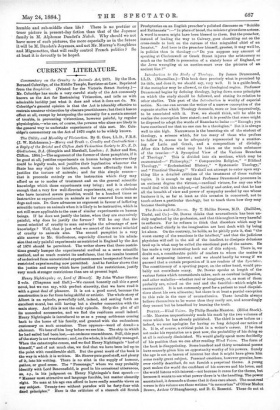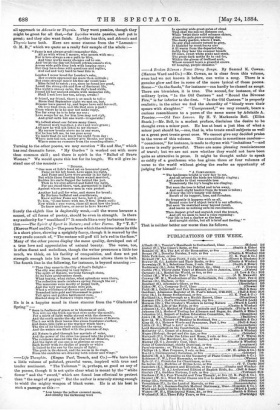Poaray.—Wind Voices. By Philip Bourke Marston. (Elliot Stook). —Mr. Marston
unquestionably made his mark by the two volumes of verse which he has already published. The third is now before us : indeed, we mast apologise for having so long delayed our notice of it. R is, of course, a critical point in a writer's career. If he does not make his reputation as a poet now, the probability of his doing so at all is seriously diminished. We would gladly speak more decidedly of his position than we can after reading Wind Voices. The form of the book is disappointing. Some hundred and thirty occasional poems have scarcely given him an opportunity worthy of his powers. Surely the age is not so barren of interest but that it might have given him some really great subject. Personal emotions, however genuine, bow. ever vividly described, do not furnish a perpetual theme. A young poet makes the world the confidant of his sorrows and his loves, and the world listens with interest—not because it cares for the theme, but because it wants to see what power there is in the handling. The power ascertained, it demands a theme that it does care about. The most real verses in this volume are those written "in memoriam" of Oliver Medea Brown, Arthur O'Shaughnessy, and D. G. Rossetti. These do not at all approach to Adonals or Thyrsis. They want passion, though they might be great for all that,—for Lycidas wants passion, and yet is great ; and they also want finish. Lycidas has this, and Adonis and Thyrsis have both. Here are some stanzas from the " Lament- 0. M. B.," which we quote as a really fair sample of the whole :— " Fame is not always good—remember this,
All ye with whom I mourn, who mourn with me ; For is love always a out e path to bliss, And time works many changes sad to see. And 'twist the dea-est friends estranrements rise, Across wide gulfs they look with longing eyes ; But they have done with questions and replies, And sad and very hard to bear this is.
London I never loved for London's sake, Her crowds oppressed me more than solitude ; But some strange music his fine ear could take Mine failed to catch; yea, since he found her good, Loved the strong ebb and flow of thictuant life, The night's uneasy calm, the day's loud strife, hound all her ancient streets with memories rife, Shall I not love her too, asleep, awake ?
0 friend, my friend, there is so much to tell—
Since that September night we met on, last, Dreams have passed lay, and hopes have said farewell. Oh love that lives, and life that soon is past ! From where he is he may not make reply, Too far away he is to hear my cry ; Love weeps for us, for him love may not sigh, And grief saith but one word—irreparable !
We talked about our future many times,
Planned work together, jt-st el and were grave ; And now he will not listen to any rhymes.
My sorrow breaks above me in one wave, For he has left me, he has gone away To lands that do not know the night from day ; Where men toil not, neither give thanks, nor pray, Where come no rumours from the sounding climes."
Turning to the other poems, we may mention " He and She," which has real dramatic force. " My Garden " is worked out with more than common skill ; and there is spirit in the "Ballad of Brave Women." We would quote this but for its length. We will give in- stead one of the sonnets :—
" BIDDEN.
" One man at Life's feast sat an honoured guest, Fame on his left hand, Love upon his right, And Fame and Love were goodly in his sight ; But while those feasting there waxed merriest, Sudden his smile flagged far behind the jest. Then in his eves altered and failed the light, For one stood there, vast, garmented in night, Against whose presence men in vain protest.
Another had gall for wine, and stones for bread; By Fortune buffeted and overthrown, Knew neither Fame nor Love, bat d a elt alone. To him, ' Came hence, with me, 0 Son,' Death said ; Now which s ems worse, since all must bow the head, To know and leave, or never to have known ?"
Surely the eighth line is deplorably weak,—all the worse because a sonnet, of all forms of poetry, should be even in strength. Is there any authority for " manlihood ?" It sounds like a very barbarous forma- tion.—The Spirit of Sport in Nature ; and other Poems. By "T. S." (Marcus Ward and Co.)—The poem from which the volume takes its title is a short piece, showing a sprightly fancy, though it is marred by the very crude conceit of, " The meteor will puff till he's red in the face." Many of the other poems display the same quality, developed out of a true love and appreciation of natural beauty. The verse, too, is often fluent and melodious, though the writer presumes a little too much, we think, on his facility of composition, and does not put strength enough into his lines, and sometimes allows them to halt. The fourth line in the following, for instance, is beyond scanning :- "Thus they came to the City of Soul's Delight— The city was sleeping in rosy light—
The spirit of Nature, working through stone, In its fairy architecture shone. What beauty, what riches, what splendour were there, The reflection made rainbows spring through the air ; The mansions were mostly of jasper built, And the very paving-stones were gilt. What a wilderness of flowers and stems Branched into gold and blossomed in gems !
Tall spire and golden battlement rose, Hushed deep in Nature's virgin repose."
He is in a happier mood in these stanzas from the " Gladness of Spring" :—
" Soon in feathers of green or in blossoms of gold, You will see the fresh sap that stirs under the mould ; For a spirit of light walks abroad with the showers, And the earth mocks the sky with its rainbows of flowers. The tt ees with their leaves like green fountains o'erflow, And dance into light as the warmer winds blow; The fire of its bloom-buds enkindles the spray, And the waters are filled with the presence of day.
All Nature is glad through her myriads of veins, And the power of the skies has passed into the plains; The rainbows descend like the chariots of Heaven, And the light of one sun is as glorious as seven. Each flower with its chalice of purple or white Is linked to the sun by the magic of light ; The grub in its shroud, and the worm in its rings, From the sunshine are drawing both colour and wings."
—Life Thoughts. (Regan Paul, Trench, and Co.)—We have here a little volume of polished, graceful verse, inspired with trite and tender sentiment. "The Talisman" is, perhaps, as good as any of the poems, though it is not quite clear what is meant by the "white flower" and the "sword," which are found less effectual to protect than " the angel of prayer." But the author is scarcely strong enough to wield the mighty weapon of blank verse. He is at his beet in such a passage as this :—
" Low hangs the yellow crescent moon, And silently the darkening west
Is opening wide great gates of cloud That shut the sun-set distance out, While 'twist their solid columns shines, Alone the pale pure evening star. The dusky garden, where I wait, Its gay glad colours turned to grey, Is haunted by scent-heavy airs S ill warm from the departed day. Softly they bear the summer breath Of roses, sweet white pinks and stock. The great dark moths tiv to and fro, Within the gloom of trellised arch, Whose summit bears a graceful crown Of hanzing, purple clematis."
—.4 Broken Silence : Some Stray Songs. By Samuel K. Cowan. (Marcus Ward and Co.)—Mr. Cowan, as is clear from this volume, even had we not known it before, can write a song. There is a genuine glow and fire in some of the more lyrical of these poems. Some—" On the Sands," for instance—can hardly be classed as songs. There are blemishes, it is true. The second, for instance, of the military lyrics, " In the Old Canteen " and " Round the Bivouac Fire," is far inferior to the first. " In the Old Canteen" is properly realistic ; in the other we find the absurdity of " bloody were their spears with slaughter." "Unexpressed," we may remark, bears a curious resemblance to a poem of the same name by Adelaide A. Procter.—Old Year Leaves. By H. T. Mackenzie Bell. (Elliot Stock.)—Mr. Bell, in a modest preface, disclaims the desire to be thought even a minor poet. He has at least a just idea of what a minor poet should be,—one, that is, who treats small subjects as well as a great poet treats great ones. We cannot give any decided praise to the verse of this volume. The execution is sometimes careless- " conscience," for instance, is made to rhyme with "imitations "—and it never is really powerful. There are some pleasing reminiscences of travel ; but we are not sure whether they would not have been quite as attractive in prose. It might be thought unfair to speak so coldly of a gentleman who has given three or four volumes of verse to the world without giving the reader an opportunity of judging for himself :— " A COMPARISON.
" The landscape bright is very fair to see,
And all around the birds are blithely singing;
And yonder to that venerable tree Tenaciously the ivy's boughs are clinging.
But soon the tree is felled and ta'en away, And each slight tendril from its trunk is taken; And now the ivy's beauty will decay, Bereft of its support, lone, and forsaken.
So frequently it happens with us all, Round some lov'd object twin'd is our affection, But soon 'tie snatched away beyond recall, And leaves us nothing save its recollection.
Then deepest grief and anguish rend the breast, And oft we seem to hear a voice repeating 'Oar life is but a shadow at the best,
And nought abides, but all is brief and fleeting.' "
That is neither better nor worse than its fellows.

































 Previous page
Previous page